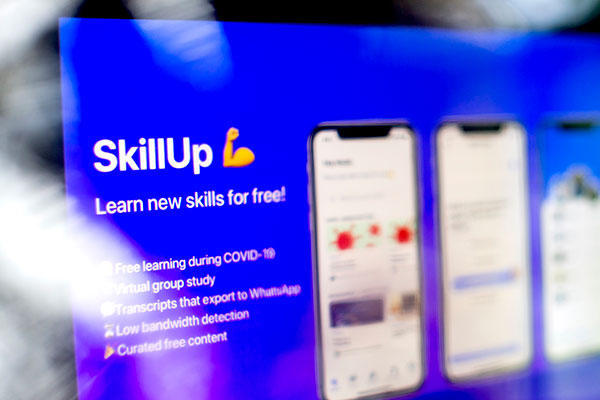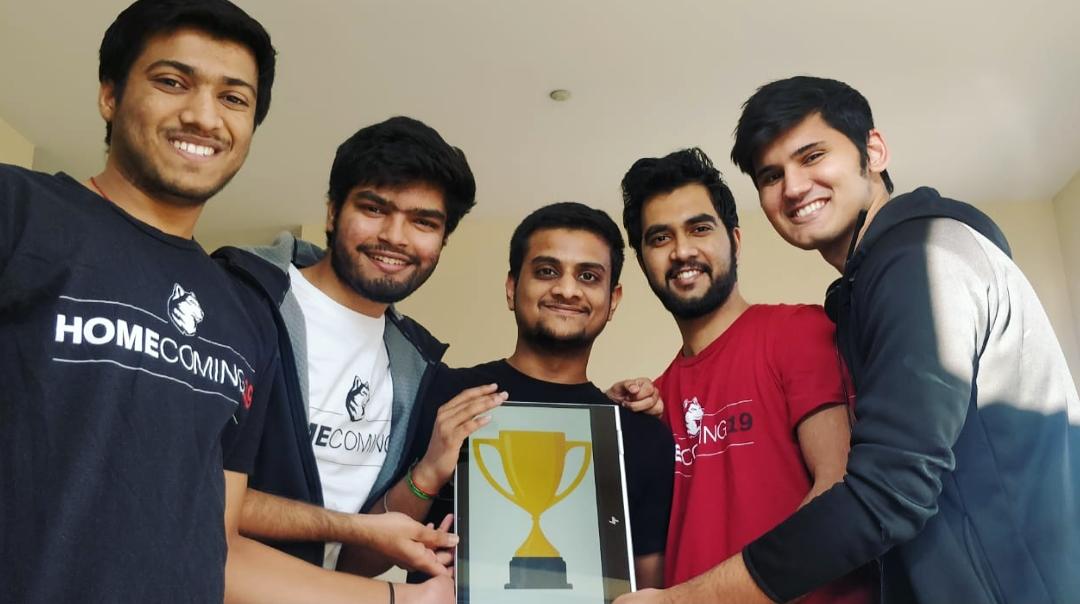Hackathon Winners Build App for Students with Limited Internet Access

College of Engineering Information Systems and Engineering Management students win COVID-19 Virtual Hackathon, in which they developed a mobile application to allow students in India to still learn skills even with limited access to the internet.
They want to make it easier for all students to learn online
Main Photo: Akash Dubey and his hackathon teammates developed SkillUp, a learning platform targeted at students who can’t afford access to the internet or who live in parts of India with low internet penetration. Photo by Matthew Modoono/Northeastern University
When the COVID-19 pandemic forced the closure of schools worldwide, online learning became the only means of continuing education in communities under lockdown. But, that wasn’t an option for many people in countries such as India, where nearly half the population still doesn’t have access to the internet.
Akash Dubey worked with non-governmental organizations and startups to increase internet access when he lived in Mumbai. Now, as a master’s student in the information systems program at Northeastern, he’s tackling the problem using a technical approach.

Akash Dubey, far right, was part of a team of graduate students who were declared winners in a virtual hackathon in May to solve immediate challenges presented by the COVID-19 pandemic. Courtesy photo
Dubey was part of a five-member team of graduate students who were declared winners in a virtual hackathon in May to solve immediate challenges presented by the global health crisis.
Focusing on remote learning, Dubey and his teammates—three from the information systems program and one from the engineering management program at Northeastern—used the hackathon as an opportunity to develop a mobile application targeted at students who can’t afford access to the internet or who live in parts of India with low internet penetration.
“Having the internet might be quite an easy task here [in the U.S.], but in India, there are a lot of places that are still suffering from having a good internet connection, and those come at a very high rate,” Dubey says. “So it’s only a thing that the rich can afford. For the poor, they have something like a low quality device that is old and just on a very low bandwidth.”
The application that Dubey and his teammates (Hemant Jain, Jayshil Jain, Sagar Shah, and Parin Shah) developed seeks to remedy this problem. The platform, SkillUp, is described as a learning tool with support for low-bandwidth users. What this means, says Dubey, is that the application works just as well on older Android phones, for example, as it does on newer models.
The application allows users to download interactive courses developed by the SkillUp team that are specialized to the user’s field of study. A high school student studying computer science, for example, can take a course on programming languages, such as Python or JavaScript.
Users can take quizzes that allow them to compare their progress with friends. They can play games in between sessions. And they can connect with previous course-takers for advice and information. One feature of the app is the integration of links to YouTube instructional videos and other free online resources.
And if users run out of data, they have the option to access a transcript of a course via Whatsapp.
Dubey and his teammates, who arrived in the U.S. last August, were supposed to start internships in Boston this summer, but had their offers rescinded because of the global outbreak. Instead of seeing it as a drawback, Dubey says they saw it as an opportunity to contribute a solution to a worldwide problem.
The best part about the hackathon, he says, was the exposure it gave him to ways that other people around the world—entrepreneurs, engineers, designers, researchers, sales people, and problem solvers—are brainstorming solutions to the coronavirus pandemic.
“It was more about learning about how the different corners of the world are thinking about a crisis that has actually united the entire world toward facing an unprecedented situation that we as a human race have not—at least in my lifetime in the last 25 years—faced before,” he says.
It took Dubey and his teammates five days to develop the app prototype, but there’s still more work that needs to be done on it. Dubey says they’re looking for mentorship on how to put the app on the market and the costs associated with that. The founders want to expand the app to other disadvantaged communities across the world, all while keeping the price tag at $0.
Dubey says he is grateful for the opportunities that Northeastern has afforded him and his teammates, and believes that the technical knowledge they’re gaining at the university will allow them to go far in addressing global issues.
“The education system here gives you the practical exposure of making and developing real-time models,” he says. “The bachelor’s system back in our hometown was much more on a theoretical concept. True, it is much more difficult, but the practical exposure that we have been getting here in the last eight months is really amazing.”
by Khalida Sarwari, News @ Northeastern